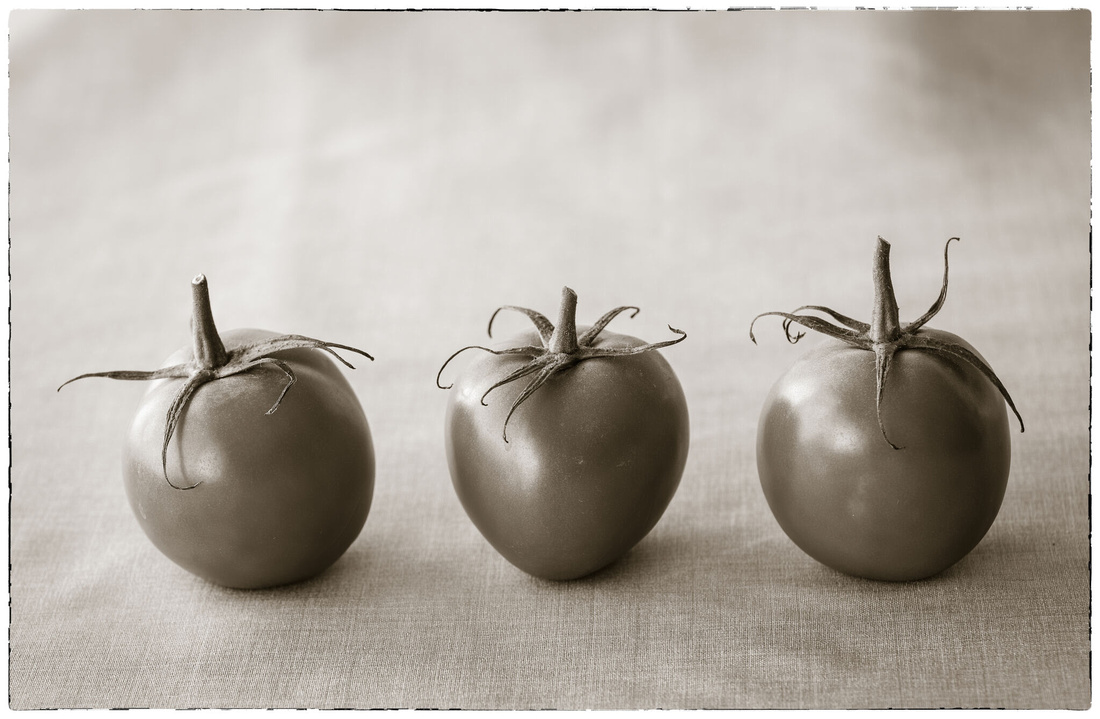Aliveness
Three Tomatoes, 2019
In her provocative book, On Beauty and Being Just, Elaine Scarry explores the nature of beauty, aesthetic experiences, and their connection to the moral life. In this lucidly written little work, Scarry notes that when we experience something as beautiful, we impart to it a sense of “aliveness.”
In highlighting aliveness, Scarry is drawing attention to the way that we experience beautiful objects as having or taking on certain lifelike qualities that beckon us into a relationship with them. We experience them as generative realities rather than as static, inert things. Aliveness transforms an it into a thou (Martin Buber). Beautiful things call out to us, make a claim on us, asking us to acknowledge their inherent worth and moral goodness. We answer the call of beautiful things by imbuing them with sanctity and inviolability. Their fragility awaken in us an urge to protect and secure them. Down deep, we sense, even if only intuitively, that the wellbeing of beautiful objects and our own wellbeing are inseparable and mutually entailing.
When we confer aliveness on something, we are welcoming it, extending a kind of hospitality to it, allowing it to take up residence under the roof of our moral regard. This requires what philosopher Iris Murdoch calls “unselfing,” a decentered state of self-forgetfulness.
But something very curious accompanies this unselfing: intense pleasure. In granting aliveness, two things happen in the same moment: we are displaced as the measure of all things as the beautiful object is placed on an elevated moral footing with ourselves; and this in turn awakens in us deep joy and pleasure. But this is counterintuitive. Most of the time we conflate pleasure with a heightened sense of our own power and importance rather than with their diminishment. Beauty exposes this narcissistic lie.
Here is a delightful fusion between the perceiver and perceived object that awakens in us a felt sense of our own essential embeddedness in the vast web of cosmic interdependencies. Freed from ourselves, we can be free for the other in joy and delight. [1]
Granting aliveness to what is beautiful makes possible graced living, a way of life in which the heart enthusiastically assents to and participates in the cosmic "yes" pronounced over the universe.
Beauty and aliveness remind us that the seeds of human fulfillment are not gathered up from the small plot of the lone heart. Rather, we come upon them scattered in the vast tangle of cosmic interdependencies that always also whisper a word of moral obligation.
Aliveness. It's there in three simple tomatoes still possessed of their delicate stems.
----------------
[1] Elaine Scarry, On Beauty and Being Just (Princeton University Press, 1999), esp. pp. 80-114.
Comments
|
January
February
March
April
May
June
July
August
(4)
September (4)
(6)
October (6)
(4)
November (4)
(2)
December (2)
|
(2)
January (2)
(1)
February (1)
March
April
(1)
May (1)
June
(1)
July (1)
August
September
(1)
October (1)
(1)
November (1)
(1)
December (1)
|
January
February
(3)
March (3)
April
May
(1)
June (1)
(4)
July (4)
(2)
August (2)
September
October
November
December
|
January
(1)
February (1)
(2)
March (2)
April
May
(1)
June (1)
July
(1)
August (1)
September
(1)
October (1)
November
December
|
January
February
March
April
May
June
July
August
September
October
November
December
|
January
February
March
(1)
April (1)
May
June
July
August
September
(1)
October (1)
November
December
|
January
February
March
April
May
June
July
August
September
October
November
December
|
January
February
March
April
May
June
July
August
September
October
November
December
|
January
February
March
April
May
June
July
August
September
October
November
December
|
January
February
March
April
May
June
July
August
September
October
November
December
|
January
February
March
April
May
June
July
August
September
October
November
December
|

